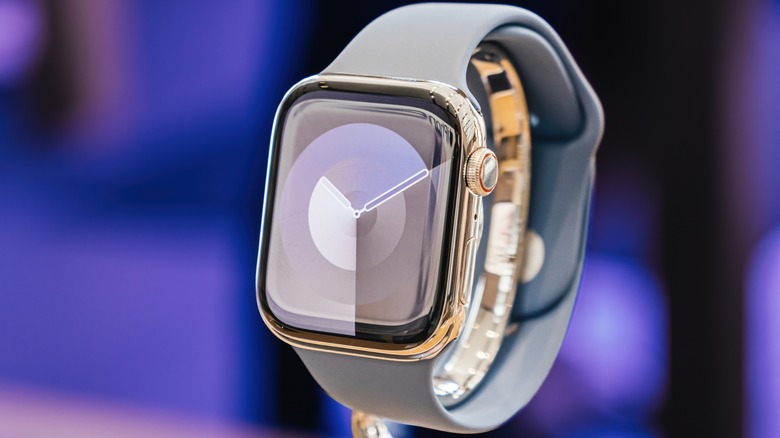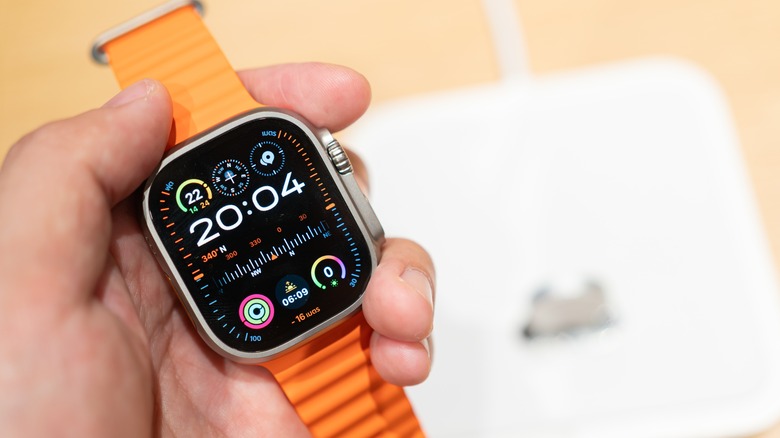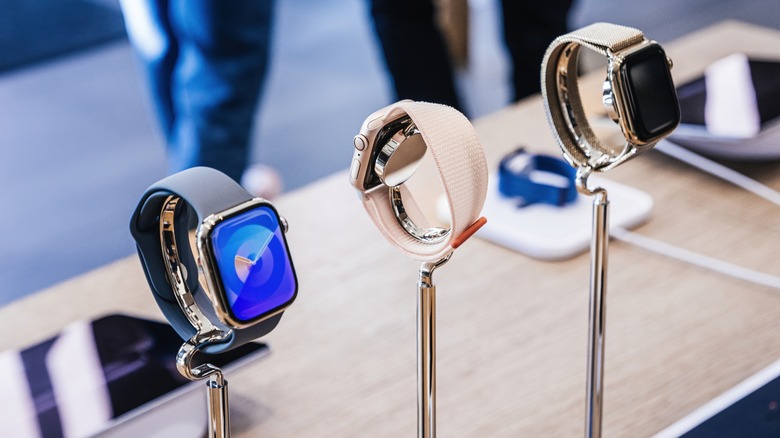The Latest Apple Watch Is Officially Banned In America: Here's Why
Earlier this month, Apple announced that it would be discontinuing sales of several models of its Apple Watch, specifically the Apple Watch Series 9 and Apple Watch Ultra 2. The reason for this hitch was a patent dispute with medical device manufacturer Masimo, who owns the patent on the pulse oximeter present in the Apple Watch devices in question. Back in October, the United States International Trade Commission ruled that Apple was in violation of this patent and, last week, denied the company's appeal. Apple's last hope was that U.S. President Joe Biden would overturn the ruling before the end of Christmas, lest the devices be banned from sale. Unfortunately for Apple, Santa didn't leave an overturning under the tree.
Following the President's decision not to intervene in the matter, the December 25 deadline has passed, and the newest Apple Watches have been pulled from shelves. In preparation for this scenario, Apple had already delisted the offending watches from its online storefront, and according to a CNN report, numerous Apple Store locations opened this morning with the watches missing as well. Third-party retailers like Best Buy, Amazon, and other big box chains still have the newest Apple Watches on offer and are permitted to sell them, but once the current supply runs out, Apple will not be able to send them anymore until this matter is settled.
You can still buy a new Apple Watch, but don't wait too long
Currently, the devices affected by this ban include not only the Apple Watch Series 9 and Apple Watch Ultra 2, but any models of the device in the Ultra line and Series 6 through 8. This is because all of these devices include the pulse oximeter feature that Masimo owns the patent on. The only newer Apple Watch model that is entirely unaffected by the ban and still readily available at all retailers is the Apple Watch SE.
Prior to the deadline, an Apple spokesperson said in a statement obtained by CNN that the company "strongly disagrees with the order and is pursuing a range of legal and technical options to ensure that Apple Watch is available to customers" and that it would be "taking all measures" to restore the flow of Apple Watch products.
With the ban officially enacted, Apple's top priority is to find a way to modify the Apple Watches, either on the software or hardware fronts, so that they no longer violate Masimo's patent. It isn't clear how long this process will take, nor how likely it will be for the International Trade Commission to accept Apple's proposed alterations.
The Apple Watch SE is the big sales ban exception
Though the Apple Watch Ultra models, as well as the new Series 9 and the past couple of older watch generations, are now temporarily banned from sale in the U.S., one modern model has bypassed the matter entirely: the Apple Watch SE 2. Why? This is the "budget" tier version of Apple's wearable, and as such it comes with certain hardware compromises that allow the company to sell it at a lower price point ($249) compared with the Series 9 and Ultra options.
One of those hardware compromises involves the blood oxygen sensor — the Apple Watch SE 2 simply doesn't have that bit of hardware. Without the physical component, the infringing software side of the equation isn't relevant to the budget-friendly alternative. Customers in the U.S. will be able to purchase new Apple Watch SE 2 models regardless of how long the sales ban drags on.
If you absolutely cannot live without the blood oxygen sensor feature, you don't have to panic yet: third-party retailers like Best Buy are still able to sell their existing new inventory of Apple Watch Series 9 and Ultra 2 models, plus the used market will no doubt remain plentiful for many months (though with the unfortunate downside of price gouging). Of course, blood oxygen sensors are also common features found in Wear OS smartwatches, so consider something like the Galaxy Watch 6 Classic if you're not shackled to Apple's ecosystem.


